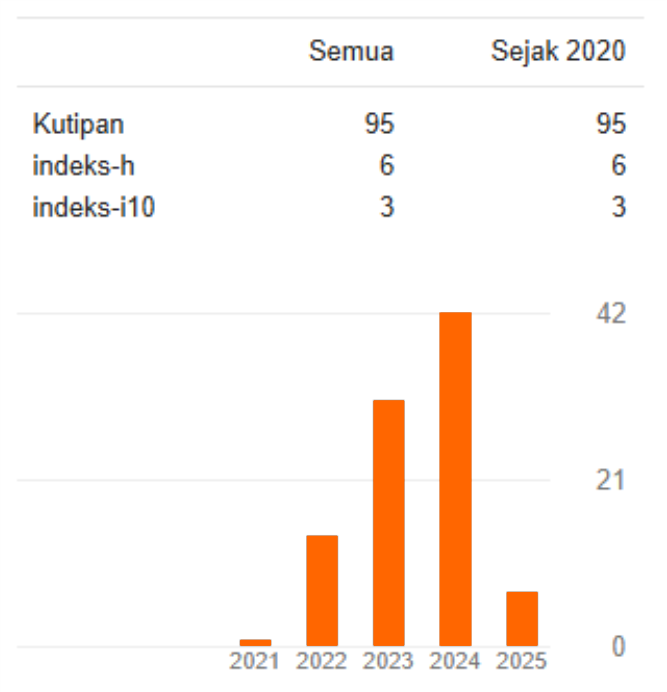Pengaruh Herding Bias, Overconfidence Bias, dan Cognitive Dissonance Bias terhadap Keputusan Investasi
DOI:
https://doi.org/10.26905/bismar.v3i2.13772Abstract
The purpose of this study is to analyze investor behavior influenced by herding bias, overconfidence bias, and cognitive dissonance bias on investment decision making. Investors were given a questionnaire as part of the quantitative data collection for this study. This study used data from a sample of 102 investors who had all been active in the capital market for at least one year, had traded, and had invested at least twice. Several statistical analyses, including convergent and discriminant validity tests, composite reliability, and significance tests, were performed on the data collected for this study. Information from this study was statistically analyzed using the SmartPLS 3.0 program. The results of this study indicate that Herding bias does not significantly affect investment decision making, overconfidence bias has a positive and significant effect on investment decision making. Cognitive dissonance bias does not significantly affect investment decision making. In this study, investors are expected to pay more attention to the latest information, suggestions, and input from other parties as considerations in the future in making investment decisions. Investors are expected to be able to control themselves in the decision-making process by considering the risks more
Downloads
References
Addinpujoartanto, N. A., & Darmawan, S. (2020). Pengaruh Overconfidence, Regret Aversion, Loss Aversion, Dan Herding Bias Terhadap Keputusan Investasi Di Indonesia. Jurnal Riset Ekonomi Dan Bisnis, 13(3), 175–187. https://doi.org/http://dx.doi.org/10.26623/jreb.v13i3.2863
Adiputra, I. G., Bangun, N., & Jullian, R. (2023). The Effect of Overconfidence Bias, Herding Behavior and Experienced Regret on Investment Decision Making on the Indonesia Stock Exchange. JOURNAL OF ECONOMICS, FINANCE AND MANAGEMENT STUDIES, 06. https://doi.org/10.47191/jefms/v6-i5-55
Afriani, D., & Halmawati, H. (2019). Pengaruh Cognitive Dissonance Bias, Overconfidence Bias Dan Herding Bias Terhadap Pengambilan Keputusan Investasi. Jurnal Eksplorasi Akuntansi, 1(4), 1650–1665. https://doi.org/https://doi.org/10.24036/jea.v1i4.168
Asri, M. (2015). Keuangan Keperilakuan (Pertama). BPFE.
Camara, O. (2017). Industry herd behaviour in financing decision making. Journal of Economics and Business, 94, 32–42. https://doi.org/https://doi.org/10.1016/j.jeconbus.2017.08.001
Danepo, M. (2018). Pengaruh Bias Perilaku Investor Terhadap Keputusan Investasi di Pasar Saham (studi pada Bursa Efek Iindonesia). Universitas Lampung.
Esi, E. F. K., Nugraha, & Purnamasari, I. (2023). Pengaruh Cognitive Bias dan Emotional Bias Terhadap Keputusan Investasi (Studi Pada Investor Muda di Galeri Investasi UNJANI). Jurnal Ekonomi Syariah Pelita Bangsa, 8(2), 221–231. https://doi.org/https://doi.org/10.37366/jespb.v8i02.799
Gozalie, S., & Anastasia, N. (2015). Pengaruh Perilaku Heuristics dan Herding Terhadap Pengambilan Keputusan Investasi Properti Hunian. Finesta, 3(2).
Jermakova, D. J. (2012). The impact of individuals’ financial behavior on investment decisions. Electronic International Interdisciplinary Conference.
Kartini, K., & Nugraha, N. F. (2015). Pengaruh Illusions of Control, Overconfidence Dan Emotion Terhadap Pengambilan Keputusan Investasi Pada Investor Di Yogyakarta. Asian Journal of Innovation and Entrepreneurship (AJIE), 4(2), 114–122. https://doi.org/10.20885/ajie.vol4.iss2.art6
Khan, M. Z. U. (2017). Impact of Availability Bias and Loss Aversion Bias On Investment Decision Making, Moderating Role of Risk Perception. Journal of Modern Developments in General Management & Administration, 1(1), 17–28.
Le, P. L., & Doan, T. (2011). Behavioral factors influencing individual investors´ decision-making and performance: A survey at the Ho Chi Minh Stock Exchange. Umea School of Business.
Ngoc, L. (2013). Behavior Pattern of Individual Investors in Stock Market. International Journal of Business and Management, 9(1). https://doi.org/10.5539/ijbm.v9n1p1
Pompian, M. M. (2006). Behavioral Finance and Investor Types. John Wiley &Sons, Inc.
Pompian, M. M. (2012). Behavioral Finance and Investor Types. John Wiley &Sons, Inc.
Pradhana, R. W. (2018). Pengaruh Financial Literacy, Cognitive Bias, dan Emotional Bias terhadap Keputusan Investasi (Studi pada Investor Galeri Investasi Universitas Negeri Surabaya). Jurnal Ilmu Manajemen, 6(3), 108–117.
Pradikasari, E., & Isbanah, Y. (2018). Pengaruh Financial Literacy, Illusion of Control, Overconfidence, Risk Tolerance, dan Risk Perception Terhadap Keputusan Investasi Pada Mahasiswa di Kota Surabaya. Jurnal Ilmu Manajemen, 6(4).
Ramashar, W., Sandri, S. H., & Hidayat, R. (2022). Faktor Psikologi dan Keputusan Investasi Mahasiswa di Pasar Modal. Jurnal Riset Akuntansi Dan Keuangan, 10(1), 93–102. https://doi.org/https://doi.org/10.17509/jrak.v10i1.36709
Rona, I. W., & Sinarwati, N. K. (2021a). Pengaruh Herding Bias dan Overconfidence Bias terhadap Pengambilan Keputusan Investasi. Studi Akuntansi Dan Keuangan Indonesia, 4(2). https://doi.org/https://doi.org/10.21632/saki.4.2.104-130
Rona, I. W., & Sinarwati, N. K. (2021b). Pengaruh Herding Bias dan Overconfidence Bias Terhadap Pengambilan Keputusan Investasi. Studi Akuntansi Dan Keuangan Indonesia, 4(2), 104–130. https://doi.org/https://doi.org/10.21632/saki.4.2.104-130
Ross, S. A., Westerfield, R. W., Jordan, B. D., Lim, J., & Tan, R. (2016). Pengantar Keuangan Perusahaan: Fundamentals of Corporate Finance (Edisi Glob). Salemba Empat.
Safryani, U., Aziz, A., & Triwahyuningtyas, N. (2020). Analisis Literasi Keuangan, Perilaku Keuangan, Dan Pendapatan Terhadap Keputusan Investasi. Jurnal Ilmiah Akuntansi Kesatuan, 8(3), 319–332. https://doi.org/10.37641/jiakes.v8i3.384
Setiawan, Y. C., Atahau, A. D. R., & Robiyanto, R. (2018). Cognitive Dissonance Bias, Overconfidence Bias dan Herding Bias dalam Pengambilan Keputusan Investasi Saham. Accounting and Financial Review, 1(1). https://doi.org/https://doi.org/10.26905/afr.v1i1.1745
Setyorini, H., Sihotang, E., & F, S. (2023). Emotional Bias, Cognitive Bias and Herding Bias toward Investment Decision for Indonesian Investor. International Journal of Social Science Humanity & Management Research, 2(8). https://doi.org/10.58806/ijsshmr.2023.v2i8n07
Umairoh, P. (2013). Cognitive Bias dan Emotional Bias dalam Pengambilan Keputusan Investasi Portofolio. Universitas Kristen Satya Wacana Salatiga.
Vieira, E. F. S., & Pereira, M. S. V. (2015). Herding behaviour and sentiment: Evidence in a small European market. Revista de Contabilidad, 18(1), 78–86. https://doi.org/https://doi.org/10.1016/j.rcsar.2014.06.003
Virigineni, M., & Rao, M. B. (2017). Contemporary Developments in Behavioural Finance. International Journal of Economics and Financial Issues, 7(1), 448–459. https://www.econjournals.com/index.php/ijefi/article/view/3809
Yulianti, I. N., & Hartati, N. (2023). Analisis Faktor-Faktor Yang Mempengaruhi Keputusan Investasi Generasi Z Di Kabupaten Bekasi. Jurnal Ekobistek, 12(2), 608–613. https://doi.org/10.35134/ekobistek.v12i2.575
Downloads
Published
Issue
Section
License
Authors who publish with this journal agree to the following terms:
(1)Â Copyright of the published articles will be transferred to the journal as the publisher of the manuscripts. Therefore, the author confirms that the copyright has been managed by the journal.
(2) Publisher of Jurnal Penelitian is University of Merdeka Malang.
(3) The copyright follows Creative Commons Attribution–ShareAlike License (CC BY SA): This license allows to Share — copy and redistribute the material in any medium or format, Adapt — remix, transform, and build upon the material, for any purpose, even commercially.







